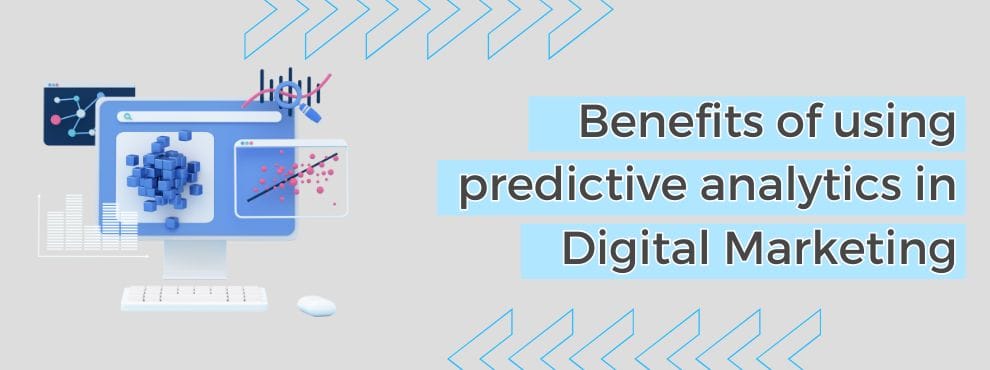The evolution of digital marketing is not only about adapting to trends, but also about staying ahead of them. In this context, predictive analytics has emerged as a key tool to understand, predict and respond to consumer needs more efficiently. This discipline, based on the application of algorithms and statistical models, not only improves decision making, but also transforms data into valuable strategies. Below, we will explore how predictive analytics can revolutionize digital marketing and the benefits it offers for companies that implement it.
Table of contents
what is predictive analytics and how does it work in Digital Marketing?
Predictive analytics uses historical data, advanced algorithms and machine learning to identify patterns and forecast future behaviors. In digital marketing, this means anticipating how consumers will behave, which products will be most in demand and which strategies will be most effective in certain contexts.
For example, an online store can use predictive analytics to analyze its customers’ purchase history and determine which products to recommend to them in the future. It can also identify which audience segments are most likely to respond to a specific campaign, thus optimizing marketing efforts and resources. This predictive capability not only increases operational efficiency, but also enhances the customer experience by delivering exactly what they need at the right time.
Benefits of predictive analytics in Digital Marketing
Personalization at scale
One of the main challenges of digital marketing is to deliver personalized experiences in a mass market. Predictive analytics facilitates this goal by analyzing real-time behavioral data and creating detailed user profiles.
For example, personalized emails and product recommendations are strategies that benefit greatly from this approach. By anticipating customer preferences, brands can create messages and offers that align perfectly with their interests, increasing conversion rates and loyalty. This capability not only improves brand perception, but also fosters long-lasting relationships with consumers.
Marketing budget optimization
Wasting resources on ineffective campaigns is a recurring problem in digital marketing. Predictive analytics helps address this challenge by identifying which channels, audiences and strategies generate the highest return on investment (ROI).
For example, predictive analytics can show that certain demographic segments are more likely to engage with social media campaigns, while others respond better to email marketing. This allows marketing teams to allocate their budget more efficiently, focusing on the tactics and channels that actually drive results.
Improved customer retention
Retaining existing customers is significantly cheaper than acquiring new ones, and this is where predictive analytics becomes an invaluable tool. By analyzing behavioral data, such as purchase frequency or interactions with the brand, predictive models can identify signs of defection.
For example, if a customer stops interacting with the brand or reduces the frequency of their purchases, predictive analytics can alert the marketing team to implement re-engagement strategies, such as offering personalized discounts or sending relevant content to re-engage them. In this way, companies not only reduce churn, but also strengthen their relationship with customers.
Forecasting market trends
In an environment as dynamic as digital marketing, the ability to forecast trends is a crucial competitive advantage. Predictive analytics enables companies to identify patterns in data that indicate which products or services will be popular in the future.
For example, by analyzing search data and shopping behavior, an online store can anticipate which seasonal products will be in greatest demand and adjust its inventory accordingly. This not only optimizes internal operations, but also improves customer satisfaction by ensuring the availability of the most desired products.
Increased efficiency in advertising campaigns
Digital advertising requires precision to be effective, and this is where predictive analytics makes a difference. Predictive models make it possible to identify which messages, formats and times of day generate the most impact in each audience segment.
For example, a Google Ads campaign can benefit from predictive analytics by determining which keywords are most likely to generate clicks and conversions. It also allows you to optimize ad bids in real time, ensuring that your budget is used in the most effective way possible.
Reduced risk in decision making
Making decisions based on intuition or limited data can be costly. Predictive analytics reduces this risk by providing insights backed by solid data. This enables marketing teams to make more informed decisions about which strategies to implement, which markets to expand into, and how to approach different customer segments.
For example, before launching a new product, a company can use predictive analytics to simulate different scenarios and predict market acceptance. This reduces uncertainty and increases the likelihood of success.
Improving customer experience
Ultimately, the goal of digital marketing is to deliver an exceptional customer experience, and predictive analytics plays a key role in this regard. By better understanding consumer needs and expectations, companies can design strategies that not only meet, but exceed those expectations.
For example, a predictive system can anticipate when a customer will need to replenish a consumable product and send them a timely reminder with a personalized offer. These proactive interactions create a more seamless and satisfying experience, strengthening the relationship between brand and consumer.
Conclusion
Predictive analytics is not just another tool in the digital marketing arsenal; it is a transformation in the way we do business. From personalization and budget optimization to improved customer retention and trend forecasting, its benefits are broad and profoundly impactful.
For companies like IDX Innovadeluxe, which specialize in providing advanced e-commerce and digital marketing solutions, incorporating predictive analytics can be a key differentiator in an increasingly competitive marketplace. Betting on this technology not only means adapting to the present, but leading the future of marketing.
Related Posts










Deja un comentario